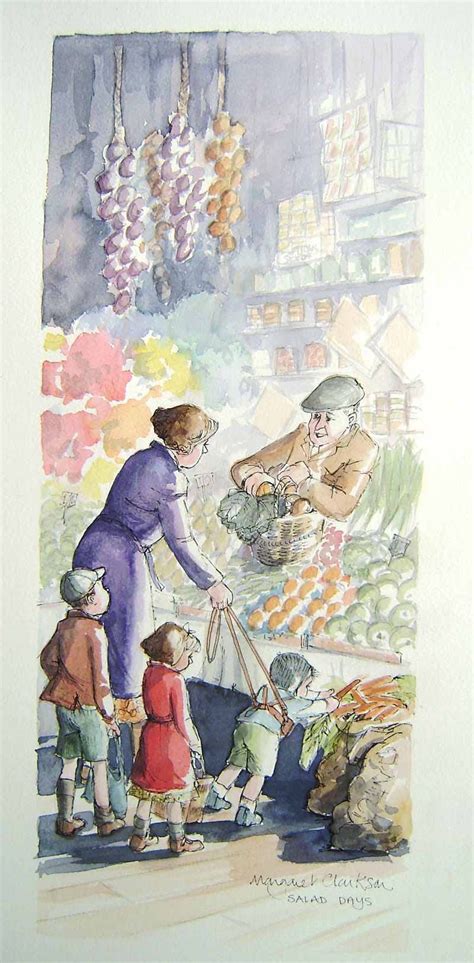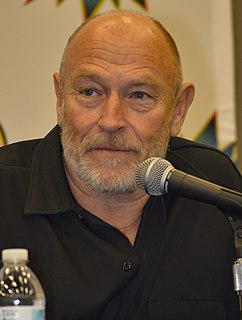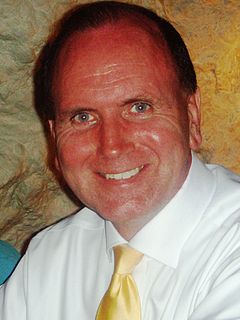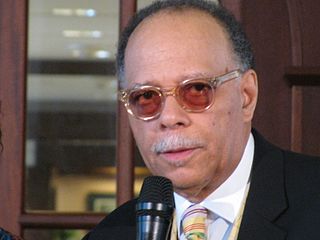A Quote by Charles Bukowski
There may not be a hell, but those who judge may create one. I think people are over-taught. They are over-taught everything. You have to find out by what happens to you, how you will react. I'll have to use a strange term here... "good." I don't know where it comes from, but I feel that there's an ultimate strain of goodness born in each of us. I don't believe in God, but I believe in this "goodness" like a tube running through our bodies. It can be nurtured. It's always magic, when on a freeway packed with traffic, a stranger makes room for you to change lanes... it gives you hope.
Quote Topics
Always
Believe
Believe In God
Bodies
Born
Change
Create
Don't Believe
Each
Everything
Feel
Find
Freeway
Gives
God
Good
Goodness
Happens
Hell
Hope
How
I Believe
I Believe In
Judge
Know
Lanes
Like
Magic
Makes
May
Nurtured
Our
Out
Over
Packed
People
React
Room
Running
Strain
Strange
Stranger
Taught
Term
Think
Those
Those Who Judge
Through
Traffic
Tube
Ultimate
Us
Use
Will
Related Quotes
On accepting adversity in our lives: Always it is initiated by an act of will on our part; we set ourselves to believe in the overruling goodness, providence, and sovereignty of God and refuse to turn aside no matter what may come, no matter how we may feel. I mistakenly thought I could not trust God unless I felt like trusting Him. Now I am learning that trusting God is first of all a matter of the will. I choose to trust in God, and my feelings eventually follow.
No matter what, we always have the power to choose hope over despair, engagement over apathy, kindness over indifference, enthusiasm over lethargy, love over hate. This is our true freedom. Whatever life may throw at us, we have the freedom and ability to choose our attitude. And I believe it is in those moments of choice that we manifest our destiny.
The mere mechanical technique of acting can be taught, but the spirit that is to give life to lifeless forms must be born in a man. No dramatic college can teach its pupils to think or to feel. It is Nature who makes our artists for us, though it may be Art who taught them their right mode of expression.
If we believe in a God at all, we must surely ascribe to him perfection of wisdom and perfection of goodness; we are then forced to conceive of Him - however strange it may sound to those who believe, not only without seeing but also without thinking - as without will, because He must always necessarily pursue the course which is wisest and best.
I think when you're running for president, especially someone that's never held elected office, there's one set of things that you may view the world through - a lens that you may view the world through. Then, you get elected and you get good people. And those good people bring you the facts. And they bring you, "Here's what's going on. Here are our options. Here's what happens if you do this. Here's what happens when you do that." And that reality begins to assert itself. And you have to react to that. You're now the president. You're no longer a candidate.
The gospel teaches us that though we may have lost a battle or two, the war is not yet over. With the Lord's help and the hope of the gospel, we can win out in the end. Truth ultimately triumphs over falsehood. Evil is overwhelmed by goodness. Sin, however extreme it may have been, can give way to cleansing and refreshing forgiveness. This is the great hope of the gospel, centered as it is in the life, mission and atoning sacrifice of Jesus Christ.
One of the great tragedies of modern education is that most people are not taught to think critically. The majority of the world’s people, those of the West included, are taught to believe rather than to think. It’s much easier to believe than to think. People seldom think seriously about that which we are taught to believe, because we are all creatures of imitation and habit.
In explaining the growth of his faith, psychiatrist Gerald May writes, "I know that God is loving and that God’s loving is trustworthy. I know this directly, through the experience of my life. There have been plenty of times of doubt, especially when I used to believe that trusting God's goodness meant I would not be hurt. But having been hurt quite a bit, I know God's goodness goes deeper than all pleasure and pain it embraces them both." Ruthless Trust, pg 22
What is God like? Because millions and millions of people were taught that the primary message - the center of the Gospel of Jesus - is that God is going to send you to hell, unless you believe in Jesus. And so, what gets, subtlely, sort of caught and taught is that Jesus rescues you from God. But what kind of God is that; that we would need to be rescued from this God? How could that God ever be good; how could that God ever be trusted? And how could that ever be good news.
That's true that I'm "not religious as that term is conventionally understood," though I've never been an atheist. Atheism is an active faith; it says, "I believe there is no God." But I don't know what I believe. I was brought up a Lutheran in Jamestown, North Dakota. I have trouble with faith. I'm not proud of this. I don't think it makes me an intellectual. I would believe if I could, and I may be able to before it's over. I would welcome that.
The trouble is that Millennials and many recent products of the public schools believe that America was made great, if they're even taught that it's great, if they're taught that it's great, you know what they're told is the reason? Diversity. There's diversity all over the world. You can go to places where there is diversity out the wazoo, folks. You can go to places all over the place world and you can find the most diversity, you can find perfect diversity, however you find it. You will not find a United States.
If we're open to it, God can use even the smallest thing to change our lives... to change us. It might be a laughing child, car brakes that need fixing, a sale on pot roast, a cloudless sky, a trip to the woods to cut down a Christmas tree, a school teacher, a Dunhill Billiard pipe...or even a pair of shoes. Some people will never believe. They may feel that such things are too trivial, too simple, or too insignificant to forever change a life. But I believe. And I always will.







































